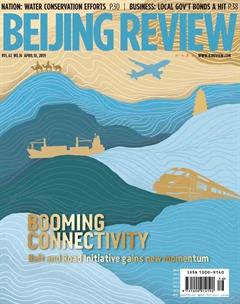ROADS TO THE WEST
By Helga Zepp-LaRouche

For the last several years or so, Western media and mainstream politicians have chosen to largely ignore the Belt and Road Initiative, which Chinese President Xi Jinping proposed in 2013. The initiative, consisting of the Silk Road Economic Belt and the 21st-Century Maritime Silk Road, effi ciently addresses the infrastructure needs of developing countries, which the West simply pretended not to exist.
But, at a certain point it dawned on the Western establishment that China was not only building an enormous amount of railway lines, ports, bridges, power plants and industrial parks in Asia, Africa and even in parts of Europe, but that the prospect of poverty alleviation offered by China instilled an unprecedented spirit of optimism.
Chinas vision
China impressed the world by lifting more than 700 million people out of poverty over the last 40 years, constructing the worlds best high-speed train network and becoming a leading space nation. It has now offered to share this experience with countries which were heretofore relegated to be the “Third World.”
Leaders of these countries suddenly demanded to be treated equally by the West, rather than simply the recipients of development aid, which would mostly vanish in the pockets of non-governmental organizations.
In an obvious coordinated fashion, many leading think tanks on both sides of the Atlantic produced lengthy studies based around a foreseeable theme. They cited that the motivation for the Belt and Road Initiative was an ill-natured attempt by China to replace the “rules-based system,” actually the Anglo-American imperialism, with Chinese imperialism and lure participating countries into a “debt trap.” They also noted that China is built on an authoritarian system and that there would be a competition of systems between the “liberal, open and social market economy” and the “state-controlled economy of China.”
Ironically, it was the same neoliberal critics who enthusiastically welcomed China into the World Trade Organization in 2001, sure that China would adopt the Western model of democracy and neoliberal economics.
Convinced of their own political and cultural superiority, these circles thought it to be a waste of their precious time to pay attention to such revolutionary concepts as a community with a shared future for humanity, presented by Xi and other Chinese leaders in hundreds of conferences and international gatherings to political leaders from all over the world.
Looking through their geopolitical spectacles and hearing through their colonial headsets, they completely dismissed the conception that China could be serious in presenting a new model of international relations, one that would put the concept of the one humanity ahead of narrow national interest. The reality that the future of existence depends on shaping a new era based on the common interest of humanity has escaped the proponents of the old collapsing world order.
Anybody who looks at the totality of Chinese policy and to what China has achieved in terms of poverty alleviation can only come to the conclusion that China means what it says.
The aim of Chinese policy is to create a new paradigm in strategic relations, whereby geopolitics is overcome through win-win cooperation, where international politics stops being a zero-sum game but instead where harmony prevails.
In this way, China is operating on the basis of Confucian philosophy, namely the idea that there can be only peace if there is a harmonious development of all. But it also carries out the principles of the Treaty of the Peace of Westphalia, that all policy for peace must be in the interest of others.
EU cooperation
The Silk Road spirit has also caught on in an increasing number of European nations, some of which have signed official documents with China to cooperate under the Belt and Road Initiative. EU member states from East, Central and South Europe, and also individual cities and regions in other parts of the continent have found it in their best interest to work with China to build new or modernize existing infrastructure, for which the EUs austerity policy has provided no funding mechanism.
Ports like Piraeus, Trieste, Duisburg, Hamburg, Rotterdam, and Sines have realized unprecedented economic opportunities to become hubs for the Eurasian land rail lines, which connected 56 Chinese cities with 49 European cities in 2018. They also have the potential to become centers for the trade routes of the 21st-Century Maritime Silk Road.
From the standpoint of universal history, this growing integration of infrastructure as the precondition of industrial and agricultural development for all is both obvious and organic.
But it has already irked the forces in Europe of the old neoliberal paradigm, who would rather accuse China of disuniting Europe, as if this needed to be, rather than reflecting on the effects of their own policies. Unlike in China, there is no plan within the EU to alleviate poverty.

